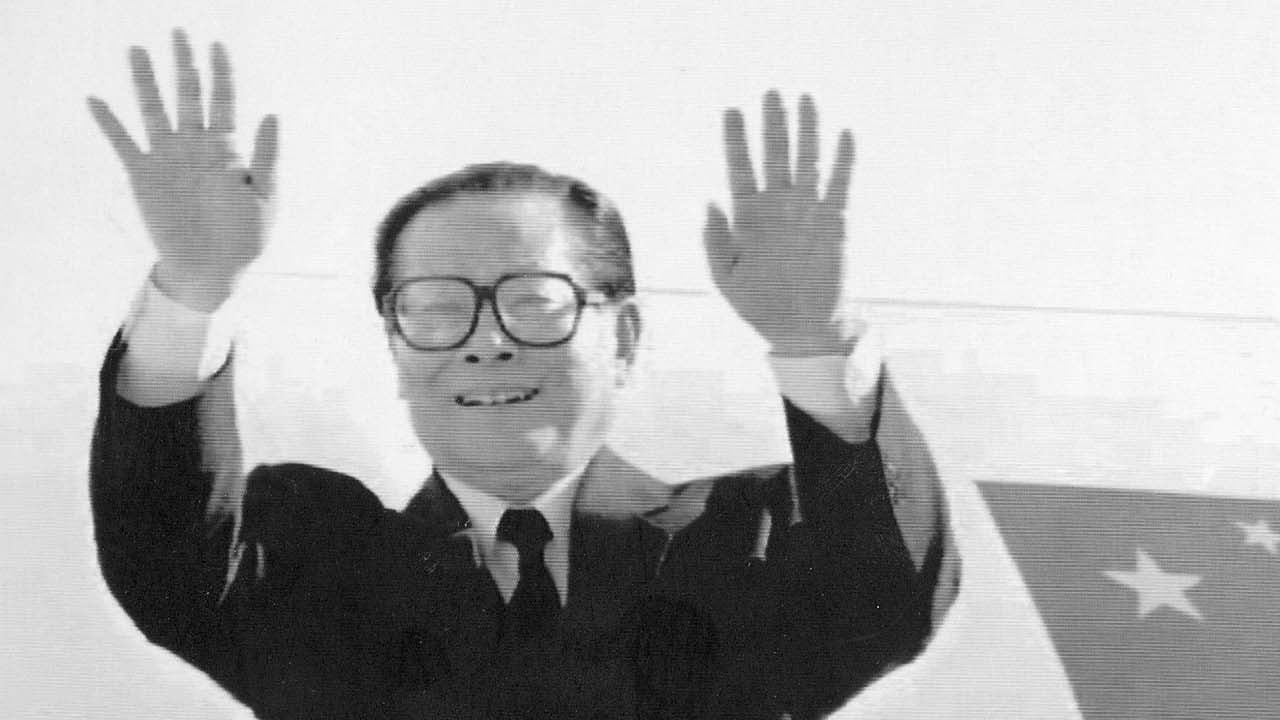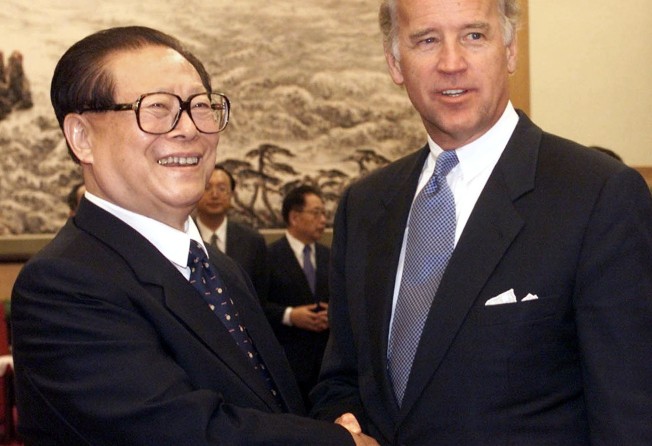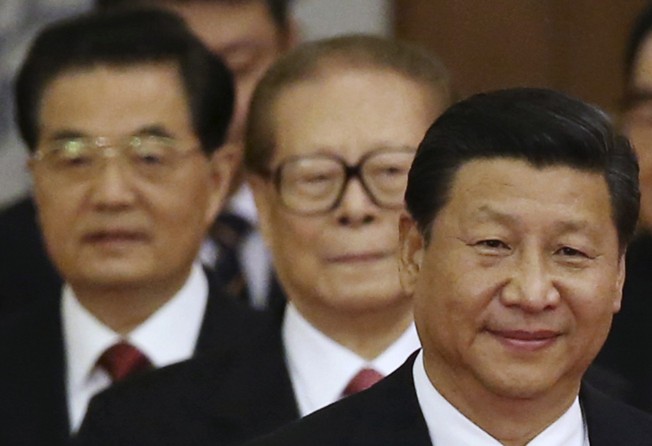
02:28
Former Chinese president Jiang Zemin dies at the age of 96

As part of SCMP’s commitment to providing comprehensive coverage of former Chinese president Jiang Zemin’s death and legacy, this story has been made freely available as a public service to our readers. Please consider supporting SCMP’s journalism by subscribing.
Jiang Zemin, China’s top leader in the 1990s and the early 2000s, has left behind a country with a much higher global standing and an economy far more integrated with the world than Communist rulers before him knew.
Jiang, who ruled the country from 1989 to 2002, died in Shanghai from leukaemia and multi-organ failure just after noon on Wednesday, according to an official announcement by state news agency Xinhua. He was 96.
It was under Jiang’s watch that China underwent some of the biggest developments that would further integrate it with the US-led global system and elevate its status as a world power.
They included the handover of Hong Kong in 1997, when the city returned to Chinese sovereignty from British colonial rule, and China formally becoming a member of the World Trade Organization in 2001.
It was also under Jiang in 2001 that Beijing secured host nation status for the 2008 Summer Olympics, a first for the country.
Jiang stepped down voluntarily, first as the party’s leader in 2002, and later as the military’s chief in 2004, to hand over the helm to Hu Jintao, with China bearing witness to the first peaceful and orderly transfer since the Communist Party was founded in 1921.
But he is known to have remained influential for a decade after he stepped down and is understood to have been among the key players behind Beijing’s decision to install Xi Jinping as heir apparent to Hu in 2007. Since ascending to lead the party in 2012, Xi has become the country’s most powerful man since supreme leader Deng Xiaoping.
“Jiang should be remembered as a leader who tried to modernise and open the Communist Party, while his successors have tried to undermine many of Jiang’s and [Jiang’s senior adviser] Zeng Qinghong’s political reforms,” said Professor David Shambaugh, director of the China Policy Programme at the Elliott School of International Affairs, George Washington University.
Jiang, who served as the party’s general secretary from 1989 to 2002, was the first top leader not to have fought in Mao Zedong’s Communist revolution, which culminated in the creation of the People’s Republic following a civil war victory in 1949.
Jiang was born in 1926 into an intellectual family in Yangzhou in Jiangsu province, eastern China, which was then under Japanese occupation. His adoptive father Jiang Shangqing, also a member of the Communist Party, died at a young age in an ambush by local Chinese warlords, and was recognised as one of the party’s early martyrs.
In his youth, Jiang was a passionate student of foreign languages, and learned English by studying the speeches of United States presidents Thomas Jefferson and Abraham Lincoln.
Jiang graduated from Shanghai Jiao Tong University with a degree in electrical engineering, having joined the party while at university.
He first worked in a car factory in Moscow, then capital of the Soviet Union, in the 1950s and was transferred to Shanghai as a deputy director of a state-owned machinery institute in the 1960s.
After the Cultural Revolution – a decade of social and political upheaval that only ended with Mao’s death in 1976 – Jiang was appointed to a department chief job at the Ministry of Machine-Building Industry in Beijing.
In 1985, Jiang was put in charge of Shanghai, first as its mayor and later its party chief. The position exposed him to key events, including hosting the reception when Britain’s Queen Elizabeth visited the city in 1986.
Jiang was Shanghai party chief when he was given the Communist Party’s top job in June 1989, a decision that surprised Jiang himself.
The appointment came as Beijing was in a crisis mode after Deng Xiaoping ordered a bloody crackdown on pro-democracy student protesters in Tiananmen Square and a far-reaching purge inside the government and state targeting sympathisers of the failed movement.
The mainstream Western media at the time did not express high hopes for Jiang’s succession. They referred to the fate of party heads previously chosen as Deng’s successors, such as Zhao Ziyang and Hu Yaobang – both purged by party elders -and believed Jiang’s leadership would only function as an interim government to solve the crisis and aftermath of the movement.

As Jiang took the helm, he had to confront stagnating economic and political reforms, and foreign investment that had dried up as Western capitals slapped sanctions on China over the 1989 crackdown.
But with firm support from Deng, Jiang not only established his own authority in the party, he mended ties with the West and restarted economic reforms interrupted by the purge.
John Lee, a China watcher with the Centre for Independent Studies in Sydney and at the Hudson Institute in Washington, said Jiang’s greatest political achievement was to ensure the party’s survival after Tiananmen. From 1989 to 1992 he successfully mixed selective repression with partial economic reforms, Lee said.
“Jiang should be recognised for his critical role in ensuring the continuation of partial reforms in the economy – particularly after the political trauma of the 1989 countrywide protests,” he added.
For most of his time in office as China’s top leader, Jiang was facing a post-Cold War world order, with Washington as the new unipolar power while Beijing gradually swept the impact of 1989’s Tiananmen crackdown under the carpet.
Shambaugh said Jiang’s diplomacy was astute, and he managed to steer China out of troubled diplomatic waters after 1989.
“Jiang personally did much to rebuild US-China relations, but he also oversaw probably the best period in China’s relations with its neighbours in Asia, as well as developing strong ties with Europe and Latin America,” he said.
Under his watch and over five visits to the US as China’s president, a title he held between 1993 to 2003, ties significantly thawed.
Beijing also weathered some of the worst geopolitical and diplomatic crises for decades, including Western sanctions that followed 1989’s violent crackdown on pro-democracy demonstrations, the 1999 US bombing of China’s embassy in Belgrade during the Kosovo war and a deadly collision between a Chinese and American warplane that killed a Chinese pilot off Hainan in southern China in 2001.
Jiang managed to remain calm and pragmatic during most of those diplomatic crises, despite the strong pressure of nationalistic public opinion in China.
The 1999 Belgrade bombing killed three Chinese nationals and caused a wave of anti-US protests in China. Days afterwards, Jiang, upon condemning Washington, called on his fellow Chinese leaders to focus on economic development and “sleep on brushwood and taste the gall”, a Chinese phrase meaning to put up with insult and focus on the long-term goal.
Jiang took a similar pragmatic path in domestic politics as he formally allowed the country’s private business owners to join the party for the first time.
That practice, seen by some as a breakthrough in both the party’s tolerance and its support for the private sector, also brought controversy.
Zhang Dejiang, the party chief of Zhejiang, famously wrote an article in 2000, publicly denouncing the idea as “blurring the nature of the party as one for the proletariat”.
Jiang managed to muster enough political strength to push that idea through the party’s apparatus near the end of his term in office.
The idea was embedded in the “Three Represents”, his signature political theory now enshrined in the constitution of the party and the state. Three Represents refers to the party representing China’s most advanced productive forces, the orientation of China’s advanced culture and the fundamental interests of the overwhelming majority of the Chinese people.
Zhu Zhiqun, a professor of political science and international relations at Bucknell University in Pennsylvania, called the Three Represents a key achievement by Jiang.
“[It] was significant since it opened the door for entrepreneurs or capitalists to join the CCP, which fundamentally transformed the CCP from a party for the working class to a party for people from all walks of life,” he said.
But Zhu saw graft and pollution as major shortcomings of Jiang’s rule.
“Rampant corruption is one of the biggest failures,” he said. “His administration did not do much to protect the environment either, with heavy focus on GDP growth.”
Jiang is remembered by many as a charismatic and confident figure, which made him stand out among other stiff, and often inscrutable, Chinese leaders.
At the age of 71, he made headlines for swimming and playing the lap steel guitar in Hawaii, and trying his skills at singing Peking opera, during a state visit to the US in 1997.

In an interview conducted by 60 Minutes reporter Mike Wallace in 2000, Jiang tackled questions on controversial issues – including the Tiananmen crackdown of 1989, the spying case involving Taiwanese-American scientist Wen Ho Lee, and tensions across the Taiwan Strait – switching with ease between Chinese and English.
Shambaugh said Jiang’s public persona was unusual for a Chinese official.
“He was open and vivacious, intellectually engaging, and understood the issues at hand,” Shambaugh said.
Those episodes have inspired a wave of nostalgic political pop art among Chinese people in recent years, long after Jiang’s retirement, as the public wielded admiration of Jiang as an indirect criticism of present policies in China, especially during the past decade.
An internet meme trend called “toad worship”, or mo ha in Mandarin, was at first a spoof of Jiang’s words and actions during his time at the top but it slowly grew into affection towards him.
Chinese internet users called Jiang “Uncle Toad” to poke fun at his physical appearance and the iconic eyewear Jiang wore in public throughout his leadership. Admirers used the slogan “one more second” to wish Jiang a long life, after repeated reports about his ailing health emerged.
Jiang’s once widely ridiculed singing and distinctive diplomatic style, including a famous hot-tempered lecturing of a Hong Kong journalist in 2004, was viewed by Chinese admirers as a humane side of the top leader and as the projection of a humane side of China to the world.
“A slightly ridiculous leader is much better than an arrogant … and self-centred leader,” a Chinese internet admirer once wrote.
Jiang married Wang Yeping in 1949 and they had two sons. Jiang Mianheng, Jiang’s elder son is a member of the party and the president of ShanghaiTech University. Second son Jiang Miankang is also a party member and a former director of the Shanghai Development Information Research Centre.
Jiang’s absence from the 20th Communist Party congress in October and the party’s centenary celebrations last year were read as clear signs of ailing health.
He was last seen in public on October 1, 2019, taking his place among party elders invited to attend the 70th anniversary celebrations of the founding of the People’s Republic and a military parade to mark the occasion.
“His passing will have little impact on China’s political landscape today,” said Zhu, adding that it did not compare to the death of Deng Xiaoping in 1997, which effectively ended the elders’ influence on Jiang.
“Unlike Deng’s passing which actually helped Jiang to step out of Deng’s shadow and lead with more confidence and style, today Xi is in firm control of Chinese politics. Jiang’s passing will have no major repercussions in China today.”